Olga's Gallery
Dear Friends of Art,
We've noticed that gradually we've collected a lot of paintings devoted
to Napoleon Bonaparte. We made a page with a short biography, illustrated
by these works, and also were looking for a little-known topic about the
outstanding Frenchman. It seems that every side of his life, personality
and activities is researched and described both in scientific literature
and in fiction. So we decided on a topic that might be less known to the
Western reader, namely,
The Great Fire in Moscow (1812)
After the Battle of Borodino, on 13 September 1812, the chief commander of the Russian Army Michael Kutuzoff, against the will of most of his generals, issued an order to retreat from Moscow. Count Rostopchin, the Governor General of Moscow, received the news of the army's retreat at the last moment and was hard pressed to evacuate his own family with no time to organize the evacuation of the city. Nobody expected such a turn of events, least of all the citizens of Moscow, who, on one hand, were not morally ready to accept the power of Napoleon, but, on the other hand, had not undertaken any measures to evacuate the wounded and sick, or any tangible property. The Moscovites simply stood up and left the city.
The morning of 14 September 1812 was beautiful, there was “the extraordinary autumn weather that always comes as a surprise, when the sun hangs low and gives more heat than in spring, when everything shines so brightly in the rare clear atmosphere that the eyes smart, when the lungs are strengthened and refreshed by inhaling the aromatic autumn air...” (Leo Tolstoy War and Peace)
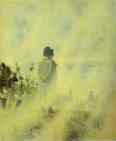 At ten in the morning of the 14th of September, Napoleon was standing among
his troops on the Poklonny Hill looking at the panorama spread out before
him. “The brightness of the morning was magical. Moscow seen from the
Poklonny Hill lay spaciously spread out with her river, her gardens, and
her churches, and she seemed to be living her usual life, her cupolas glittering
like stars in the sunlight.” (Leo Tolstoy War and Peace). If
Napoleon had hurried to enter the city he could have caught the rearguard
of the retreating Russian army and many of her leaving inhabitants. But
he was busy waiting for a deputation of boyars with the keys from the city
that would never come… He had been waiting for a long time, until his scouts
informed him “that there were drunken mobs left in Moscow but no one
else.” (Tolstoy)
At ten in the morning of the 14th of September, Napoleon was standing among
his troops on the Poklonny Hill looking at the panorama spread out before
him. “The brightness of the morning was magical. Moscow seen from the
Poklonny Hill lay spaciously spread out with her river, her gardens, and
her churches, and she seemed to be living her usual life, her cupolas glittering
like stars in the sunlight.” (Leo Tolstoy War and Peace). If
Napoleon had hurried to enter the city he could have caught the rearguard
of the retreating Russian army and many of her leaving inhabitants. But
he was busy waiting for a deputation of boyars with the keys from the city
that would never come… He had been waiting for a long time, until his scouts
informed him “that there were drunken mobs left in Moscow but no one
else.” (Tolstoy)
Finally Napoleon gave the order to enter Moscow. When Kutuzoff was
told that the Great Army started at last entering the city, he said, “Thank
God! It's their last triumph!”
“Meanwhile Moscow was empty. There were still people in it, perhaps
a fiftieth part of its former inhabitants had remained, but it was empty.
It was empty in the sense that a dying queenless hive is empty.” (Tolstoy).
While the French army was occupying the big city, its dead tranquility and emptiness started to influence the soldiers. ‘The absolute stillness around us made us keep silence and listen nervously for every sound. Even the bravest felt fear…,’ one of the soldiers wrote later. A soldier named Bourgogne confirms this, “We were surprised that we did not see anybody around… We could not decide what to attribute this complete silence to: such a beautiful city and so soundless, somber and deserted! We heard only our own footsteps… Of course we did not speak much… First we tried to re-assure ourselves that the citizens were in their houses and were secretly watching us… we could not even imagine that such rich and beautiful houses had been abandoned by their owners… Approximately an hour after our entrance into the city, the fires started… we thought that looters from among us set the fires unintentionally… We didn't think the Russians were so barbaric that they would set fire to their property and destroy one of the most beautiful cities of the world!” (cited from Vereshchagin's Napoleon in Russia).
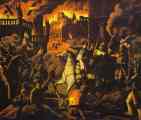 The
real tragedy was still ahead.
The
real tragedy was still ahead.
‘Though tattered, hungry, worn out, and reduced to a third of their
original number, the French entered Moscow in good marching order. It was
a weary and famished, but still a fighting and menacing army. But it remained
an army only until its soldiers had dispersed into their different lodgings.
As soon as the men of the various regiments began to disperse among the
wealthy and deserted houses, the army was lost forever and there came into
being something nondescript, neither citizens nor soldiers but what are
known as marauders. When five weeks later these same men left Moscow, they
no longer formed
an army. They were a mob of marauders, each carrying a quantity
of articles, which seemed to him valuable or useful. The aim of each man
when he left Moscow was no longer, as it had been, to conquer, but merely
to keep what he had acquired.’ (Tolstoy)
Napoleon entered Moscow the next day, on September 15. His head-quarters
were in the Kremlin. Napoleon knew what the Kremlin meant for Russians.
For several hours the emperor was happy and proud - he was in Moscow, in
the Kremlin, in the palace of the tsars! He thought that the aim of the
campaign was achieved. Here, in the Kremlin he would sign a peace treaty
with the Russian Emperor on his own conditions.
He issued his first orders to arrange stability in Moscow. After 24
hours of plundering, it was time to restore order. But the morning of the
next day turned into a horrible tragedy. A hurricane that started in the
morning, spread the fires across the city; Moscow's left bank was a raging
inferno, the stores on the Red Square caught fire, very soon the streets
around the Kremlin were also blazing. The strongest wind picked up burning
pieces of wood and brought them down on the buildings of the Kremlin. One
of the towers caught fire. Soldiers rushed to put it out as there was a
depot of powder in the Kremlin that could explode at any moment.
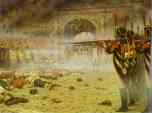 Napoleon,
with some of his aides, hurried to leave the Kremlin, but there was nowhere
to go – the fire was everywhere and soon they lost their way. That might
have been the end of the great man, but for the soldiers of Marshal Davout,
who were looting the city that day. They met Napoleon among the flaming
buildings and evacuated him by a route where the buildings were already
burnt to ashes out of the city. That night Napoleon stayed in the Petroff
Palace, outside Moscow.
Napoleon,
with some of his aides, hurried to leave the Kremlin, but there was nowhere
to go – the fire was everywhere and soon they lost their way. That might
have been the end of the great man, but for the soldiers of Marshal Davout,
who were looting the city that day. They met Napoleon among the flaming
buildings and evacuated him by a route where the buildings were already
burnt to ashes out of the city. That night Napoleon stayed in the Petroff
Palace, outside Moscow.
The inferno in Moscow continued.
‘On Wednesday in the morning the hurricane of wind started and the
fire began to spread with enormous speed. Within an hour the whole city
was on fire, a sea of fire, waves rising sky-high, spreading desolation
and horror throughout. The air over the city was a burning mass, spitting
embers in all directions, and the firestorm was still growing. Never did
our Lord in His anger, present a spectacle more horrible than this: fire
everywhere, looters trying to escape with nowhere to run. Churches burning,
houses burning. It was like the boiling of Hell, everything breaking, collapsing.
Burning logs rolling through the streets and embers cascading, red-hot
sheet metal falling from roofs, the intense heat makes it impossible to
breathe, and impossible to run: the cobbles of the street are hot as a
frying pen. Belltowers are all aflame, the bells breaking loose, tumbling,
falling…” One of Napoleon's soldiers recollected.
A soldier named Labaume witnesses, ‘The fire soon caught in the best
quarters of the city. In a minute all those beautiful buildings, which
so aroused our admiration, were destroyed by it. Their excellent frontons,
decorated with bas-reliefs and statues, were falling onto the ruined columns.
Churches were falling and the church towers too… Only yesterday we admired
their shining domes…
Hospitals, which were full of wounded, were also on fire and the scenes
which took place inside were just terrible… All those miserable men
died in fire…’ 20-25 thousand of wounded Russian soldiers, who were not
evacuated died in the fire.
70% of the city was ruined by fire; unique palaces with works of arts,
rich mansions, and churches perished forever.
‘Many officers rushed to find shelter in the [Petroff] palace,’ wrote
Philippe-Paul de Segur (1780-1873), Napoleon's aide-de-camp. ‘The commanders,
including the Marshal Mortier himself, had been fighting the fire for 36
hours and were exhausted!.. Everyone was silent, we accused ourselves.
We thought that lack of discipline and hard drinking of French soldiers
started the misfortune and the strong wind spread it… We could not look
at each other… we were an army of criminals… All these disappointing thoughts
started to dissolve only when we learned that the Russians were setting
the fires! Officers, who were coming from different places of the burning
city said the same, there was no doubt any longer!”
Astonished Napoleon exclaimed, ‘What savages! To annoy me they burn their own history, the works of centuries!’
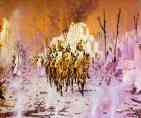 On
17 September, rainstorms suppressed the fire. But the beautiful city was
gone.
On
17 September, rainstorms suppressed the fire. But the beautiful city was
gone.
The terrible fire of 1812 arose many opinions and arguments about the
causes of its origin. The fire started on 2 (14) September 1812, when the
Great Army entered Moscow. At night the Russians had burnt depots with
ammunition, food and forage.
On the other hand from the very first day Moscow was announced to be
a trophy and was given to soldiers for plunder. And it's a fact that the
soldiers not only took what they liked, but also burnt what they could
not take away.
The best explanation of the tragedy so far belongs to Leo Tolstoy, who
wrote in his War and Peace:
"The French attributed the Fire of Moscow au patriotisme feroce
de Rostopchine, the Russians to the barbarity of the French. In reality,
however, it was not, and could not be, possible to explain the burning
of Moscow by making any individual, or any group of people, responsible
for it… Deserted Moscow had to burn as inevitably as a heap of shavings
has to burn on which sparks continually fall for several days. A town built
of wood, where scarcely a day passes without conflagrations when the house
owners are in residence and a police force is present, cannot help burning
when its inhabitants have left it and it is occupied by soldiers who smoke
pipes, make campfires of the Senate chairs in the Senate Square, and cook
themselves meals
twice a day…
‘However tempting it might be for the French to blame Rostopchin's
ferocity and for Russians to blame the scoundrel Bonaparte, or later on
to place an heroic torch in the hands of their own people, it is impossible
not to see that there could be no such direct cause of the fire, for Moscow
had to burn as every village, factory, or house must burn which is left
by its owners and in which strangers are allowed to live and cook their
porridge. Moscow was burned by its inhabitants, it is true, but by those
who had abandoned it and not by those who remained in it. Moscow when occupied
by the enemy did not remain intact like Berlin, Vienna, and other towns,
simply because its inhabitants abandoned it and did not welcome the French
with bread and salt, nor bring them the keys of the city.’
34 days after capturing Moscow, on October 18, Napoleon ordered to leave
it. To deceive his own soldiers, Napoleon announced that he left that ‘garbage
pit – Moscow – to Russian paupers and thieves’, and he himself went to
find and finish off Kutuzoff.
Later, not long before his death he would say, ‘I should have died
immediately after entering Moscow!’

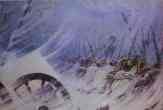 The
French army had to retreat by the Smolensk road, by which they had come
and which was looted by war. All other roads were blocked by Russian troops
and partisans, who seized practically all the transports with food and
forage. Winter came unusually early that year with very low temperatures,
which are extremely dangerous especially for the hungry. Many French soldiers
just froze to death. By November 24 only 70-75 thousand reached the river
of Berezina, almost half of them were sick, wounded, and had no arms. Standing
in the icy water, the French field engineers built a floating bridge. The
crossing was attacked. It's difficult to say now, how many soldiers Napoleon
lost in that battle, some historians give the number of 20, others 30-35
thousands. Only 30 thousand reached the west borders of Russia.
The
French army had to retreat by the Smolensk road, by which they had come
and which was looted by war. All other roads were blocked by Russian troops
and partisans, who seized practically all the transports with food and
forage. Winter came unusually early that year with very low temperatures,
which are extremely dangerous especially for the hungry. Many French soldiers
just froze to death. By November 24 only 70-75 thousand reached the river
of Berezina, almost half of them were sick, wounded, and had no arms. Standing
in the icy water, the French field engineers built a floating bridge. The
crossing was attacked. It's difficult to say now, how many soldiers Napoleon
lost in that battle, some historians give the number of 20, others 30-35
thousands. Only 30 thousand reached the west borders of Russia.
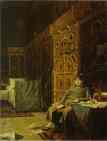 On
December 5 Napoleon left the remnants of the army to Murat and hurried
to France. He knew that Great Britain had convinced Alexander I to continue
the war into Europe and he urgently needed to mobilize a new army.
On
December 5 Napoleon left the remnants of the army to Murat and hurried
to France. He knew that Great Britain had convinced Alexander I to continue
the war into Europe and he urgently needed to mobilize a new army.
Crossing the Niemen in a sled Napoleon looked back at that land, Russia, which started to disappear in the white blizzard. He would try to forget the bloody horror of Borodino, the wall of fire in Moscow, and his own hungry soldiers dying in the snow… he would try, but he could not forget.
"The actors of 1812 have long since left the stage, their personal interests have vanished leaving no trace, and nothing remains of that time but its historic results." (Tolstoy)